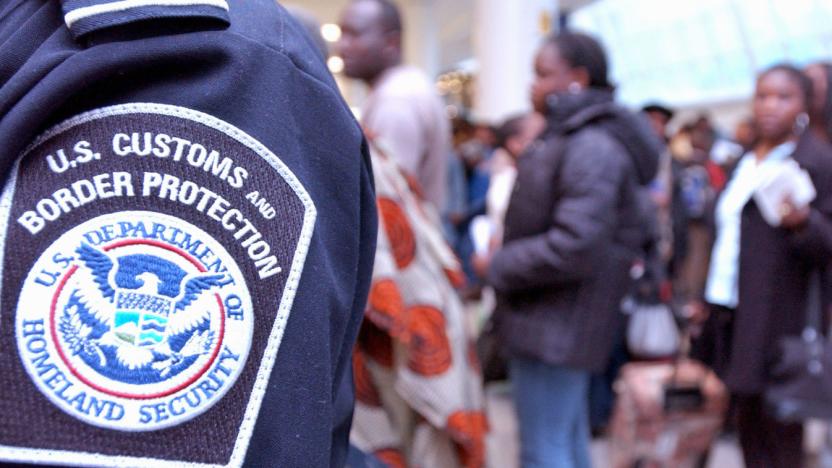BorderPatrol
Latest

US ordered social media checks for some visa applicants
US Secretary of State Rex Tillerson ordered "mandatory social media checks" on all visa applicants who visited ISIS-controlled regions, according to memos seen by Reuters. That could explain why some visitors to the US have complained about increased demands by customs officials to access phones and passwords for Twitter, Facebook and other social media accounts.

Homeland Security wants social media info from foreign visitors
Someday, departure and arrival forms in the US might have a new section asking foreign nationals for their Facebook and Twitter accounts. The Department of Homeland Security has submitted a proposal to add a section in those forms that reads: "Please enter information associated with your online presence--Provider/Platform--Social media identifier." According to the info published by the Federal Register, it would be an optional field and would only ask for people's usernames on social media platforms, not their passwords.

Eurocopter X3 hybrid sets new speed record of 430km/h, readies for next search and rescue mission
See that chopper right there? That's the Eurocopter X3, and as of last week, it can cruise at more than half the speed of a commercial jet. Although the helicopter was striving to hit 220 knots, it actually blew past that milestone to maintain 232 knots (450 km or 279.6 miles per hour) in level, stabilized flight -- a new record for this aircraft. For the uninitiated, the X3 earns its "hybrid" moniker by combining two turboshaft engines that power five-blade main rotor system and two propellers installed on short-span fixed wings -- which, in layman's terms, allows it to hover like a helicopter should while reaching the kind of speeds you'd expect from a turboprop-powered aircraft. (And before you get too excited, yes, this one requires pilots.) While we love the idea of a high-speed joy ride for tourists, this thing will be used for long-distance search and rescue missions, along with border patrol, coast guard duties, offshore operations, passenger and troop transport, and medical evacuation. So no ride for you, but you can get your vicarious thrill anyway with a short, percussion-heavy video after the break.

US opts to derez virtual fence along Mexico border, replacing it with more affordable measures
Remember that hugely ambitious "virtual fence" that the US Homeland Security department was so keen on blowing a few billion dollars on? Well, following a bunch of setbacks and delays in its development, it's now been determined to be too darn expensive and is being scrapped. That's not without splashing some cash, however, as it's estimated that a billion dollars has already been spent on installing sensor towers along a 53-mile stretch of the Arizona border with Mexico. The plan now is to redirect funds to more conventional (and commercially available) surveillance measures, such as thermal imaging and unmanned aerial drones, which is estimated to cost $750 million to cover the remaining 323 miles of Arizona's border. Whatever happens, keeping illegal immigration and contraband smuggling to a minimum isn't going to be a cheap task. Almost makes you wonder if this isn't a problem better solved by non-technological means.

Laptops can be confiscated and searched at US border without cause says report
In further evidence of our rapidly eroding civil liberties, the Department of Homeland Security disclosed today that US Customs and Border Protection and US Immigration and Customs Enforcement have the right to confiscate and search a traveler's laptop or other electronic device without any suspicion of wrongdoing. The rules -- which we reported on in February -- allow for searches of hard drives, flash drives, cellphones, iPods, pagers, and video or audio tapes, and specify that the agencies can "detain" belongings for a "reasonable period of time," (i.e., as long as they please). Additionally, the DHS can share the data found with other government agencies or private entities for translation, decryption, or (astoundingly vague) "other reasons." The DHS says the policies apply to anyone entering the country -- including US citizens -- and claim the measures are necessary to prevent terrorism. In other news, Big Brother issued a statement today guaranteeing a bonus for turning over family members suspected of crimethink to the Thought Police.[Via Switched]

Border Patrol's virtual fence canceled for not being as good as a fence
The last we heard of DHS's "Project 28" plan to build a 28-mile stretch of virtual fencing along the US / Mexico border in Arizona, it had been postponed until at least 2011 because the towers didn't quite work. Well, it appears that on further review, the system is even more of a total failure, and it's being scrapped entirely: according to Kelly Good, deputy director of the administration's Secure Border Initiative program, Project 28 "hasn't come close" to meeting Border Patrol's goals. Tests of the virtual fence didn't lead to nearly as many arrests as designers had hoped, and the lag from sensor detection to transmission of an image to border agents was apparently a big part of the problem. Boeing, which won the $860M contract to build the system, is now being told to replace it all with upgraded towers, but there's no word on when that's happening or what it'll cost taxpayers on top of the $20M already paid out. We're expecting trillion-dollar chain-link bids to come rolling in any day now.

Border Patrol's mobile sensor tower passes first test
It looks like the U.S. Border Patrol's fleet of aerial drones will soon be getting a bit of land-based backup, with the first of a series of Boeing-built mobile sensor towers recently passing its first key test. According to the company, the 98-foot tall towers will each be loaded up with a full array of gear, including cameras, radar, wireless data access points, and a tower security system, among other communications and computer equipment, with each tower boasting a line of sight range of about 12 miles. Don't expect the border to become one big hotspot anytime soon, however, with just nine towers currently on track for deployment along the Southwest border in June and no apparent word on further expansion just yet. In any event, we're guessing they wouldn't take too kindly to anyone trying to leech on their bandwidth.[Via The Register]

Web surfers to help Texas monitor border cams
Texas Governor Rick Perry has just announced a plan to leverage the eyeballs of millions of voyeuristic web surfers into a de facto army of unpaid border guards, by allowing the general public to watch live streams from video cameras trained on the Mexican border and call a toll-free number to report illegal crossings. Although the governor did not go into details on how many cameras would be installed nor how far apart they would be positioned, he did estimate the cost of the program at around five million dollars, which would buy almost 3,000 high-def HDR-HC3 camcorders even if Sony decided not to give the state a bulk discount. Leaving the whole immigration issue aside, what really stands out about this project is that it could possibly set a precedent for inner-city officials to open up their surveillance cameras to John Q. Public -- so instead of some authoritarian regime monitoring every citizen's activities, "Big Brother" will actually become all of us.[Via BBC News]



